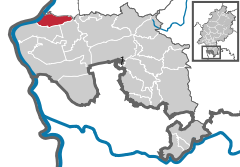Groß-Rohrheim
| Groß-Rohrheim | ||
|---|---|---|
| ||
 Groß-Rohrheim | ||
Location of Groß-Rohrheim within Bergstraße district 
 | ||
| Coordinates: 49°43′0″N 8°29′0″E / 49.71667°N 8.48333°ECoordinates: 49°43′0″N 8°29′0″E / 49.71667°N 8.48333°E | ||
| Country | Germany | |
| State | Hesse | |
| Admin. region | Darmstadt | |
| District | Bergstraße | |
| Government | ||
| • Mayor | Rainer Bersch (SPD) | |
| Area | ||
| • Total | 19.56 km2 (7.55 sq mi) | |
| Population (2015-12-31)[1] | ||
| • Total | 3,768 | |
| • Density | 190/km2 (500/sq mi) | |
| Time zone | CET/CEST (UTC+1/+2) | |
| Postal codes | 68649 | |
| Dialling codes | 06245 | |
| Vehicle registration | HP | |
| Website | www.gross-rohrheim.de | |
Groß-Rohrheim is a community in the Bergstraße district in Hesse, Germany.
Geography
Location
The community lies 3 km east of the Rhine in the middle of the Hessisches Ried north of Biblis.
Neighbouring communities
Groß-Rohrheim borders in the north on the town of Gernsheim (Groß-Gerau district), in the east on the community of Einhausen, in the south on the community of Biblis and in the west on the district-free city of Worms (Rhineland-Palatinate) and the community of Hamm am Rhein (Alzey-Worms district in Rhineland-Palatinate).
Constituent communities
Groß-Rohrheim has two Ortsteile, or quarters, split by the railway right-of-way running between Frankfurt and Mannheim, the older, original centre west of the tracks and a new town development on the east side.
History
In 782, Groß-Rohrheim had its first documentary mention in the Lorsch Codex. Names for the community changed over the centuries from Rohrheim superior to villa Rorheim to Ober Rorheim and then to Groß-Rohrheim, the name it has borne since 1689 (groß means “great” in German). In the Middle Ages, the Lorsch Abbey was the feudal overlord; later it was the Lords of Bickenbach, the Counts of Erbach and the House of Katzenelnbogen or their successors, the Landgraves of Hesse. The Erbach family’s share was sold off as early as 1714 to Hesse-Darmstadt.
The Thirty Years' War and later, French raids took a heavy toll on the community. In 1659, Landgrave Georg II of Hesse conferred upon “his loyal subjects in the market town of Groß-Rohrheim” a free and open market, the Maimarkt, still in existence now. Over the last 50 years only 15 of the original agricultural operations at that time have survived.
Politics
Community council
The municipal election held on 26 March 2006 yielded the following results:
| Parties and voter communities | % 2006 |
Seats 2006 |
% 2001 |
Seats 2001 |
| Social Democratic Party of Germany | 54.1 | 10 | 62.5 | 14 |
| Christian Democratic Union of Germany | 24.6 | 5 | 25.4 | 6 |
| Bürger für Groß-Rohrheim | 21.3 | 4 | 12.1 | 3 |
| Total | 100.0 | 19 | 100.0 | 23 |
|---|---|---|---|---|
| Voter turnout in % | 52.8 | 61.4 | ||
Mayors
At the mayoral election in 2008, Rainer Bersch was victorious. From 1990 until then, Heinz Roos (SPD) had been Groß-Rohrheim’s mayor.
Town partnerships
-
 Mouzon, Ardennes, France since 1989
Mouzon, Ardennes, France since 1989
Culture and sightseeing

- Historic timber-frame houses near the Evangelical church from 1688 to 1723, as well as the ceiling paintings in the church
- Memorial to the planner of the Rhine channel, Claus Kröncke.
Transport
Groß-Rohrheim lies on the Mannheim–Frankfurt railway.
References
- ↑ "Bevölkerung der hessischen Gemeinden". Hessisches Statistisches Landesamt (in German). August 2016.
External links
| Wikimedia Commons has media related to Groß-Rohrheim. |
- Infoportal Groß-Rohrheim (German)
